
Jamaica remains in a state of emergency after being battered by Hurricane Melissa, one of the strongest Atlantic cyclones in history. The Category 5 storm slammed into Jamaica on Tuesday with 185-mile-per-hour winds, and the extent of the damage is not yet known because communication remains limited. Mikaela Loach, a Jamaican British climate justice activist, says the hurricane was “caused by the climate crisis,” and says fossil fuel companies are to blame. It’s important to “direct that anger towards people who are responsible,” Loach says, suggesting that hurricanes be named after oil executives.
Transcript
AMY GOODMAN: This is Democracy Now!, democracynow.org. I’m Amy Goodman, with Juan González.
Jamaica remains in a state of emergency after being battered by Hurricane Melissa, one of the strongest Atlantic hurricanes in history. The Category 5 storm slammed into Jamaica Tuesday with 185-mile-per-hour winds. Communication remains limited across much of the island, so the extent of the damage is not fully known. One Jamaican official told CNN there’s extensive damage to homes, schools, hospitals in southwestern Jamaica.
Hurricane Melissa is now battering Cuba, where it made landfall today as a Category 3 storm. Severe flooding has been reported in Cuba. The storm is expected to hit the Bahamas later today.
Climate researchers say the storm was supercharged by abnormally warm waters in the Caribbean.
We go now to Mikaela Loach, Jamaican British climate justice activist, the author of It’s Not That Radical: Climate Action to Transform Our World, as well as the children’s book, Climate Is Just the Start. Mikaela will be attending next month’s COP30 climate summit in Brazil as part of Greenpeace’s delegation. Democracy Now! will be there, as well.
So, Mikaela, we’ll see you there. But let’s talk about this latest. One of the strongest hurricanes, most devastating hurricanes in history, has just hit Jamaica. Can you talk about what you understand, with family still there — we’re speaking to in Brighton, England, but you’re from Jamaica — and how this links to climate change?
MIKAELA LOACH: Thank you so much for having me on again, Amy.
It’s been an awful few days. Everyone in Jamaica, my family, my friends, over the last few days have been feeling just incredibly tense at this upcoming storm. Thankfully — I kind of lost contact with my family overnight, and then was — had a lot of terrified dreams and interrupted sleep, but this morning, thankfully, I managed to get back in contact with them. And thankfully, my family are OK. My aunt’s nephew’s house, though, has been completely flattened by the hurricane, and so he’s lost his home. But thankfully, all of my family are physically OK. And now it’s just: How do we recover from this? A lot of people are exhausted, because in order to try and keep homes safe, that have remained safe, it’s required people to be constantly, like, you know, removing water from them.
This is actually a complete catastrophe, and it’s really quite terrifying. And it also just makes me quite angry that it doesn’t have to be this way. Like, this has been caused by the climate crisis, by fossil fuel companies. And so, I think it’s important that we’re not just, like, devastated and sad about this, but also we are angry and direct that anger towards the people who are responsible.
JUAN GONZÁLEZ: And, Mikaela, you’ve suggested that hurricanes should be named after those who you say are responsible for climate change. Could you expound on that?
MIKAELA LOACH: Yeah, so, we currently name hurricanes after just, you know, people’s names, in order to distinguish, basically, between storms that are happening at the same time. So that’s why this storm is currently called Hurricane Melissa. But I think when we call these things “natural disasters,” or even just calling it this, like, feminine, nice name of Melissa, we’re not making it clear to people that there are actually people who are, you know, around today who are profiting from creating the conditions that make these hurricanes possible.
You spoke earlier about how hot oceans have supercharged this storm. So, it was able to double in speed in just 24 hours, which is kind of unprecedented, because of these extremely and unnaturally hot seas. And our seas are extremely and unnaturally hot because of fossil fuels being burned at rates that are absolutely ridiculous and unnecessary for decades, and because of fossil fuel companies deliberately lobbying against climate progress, and also companies like Exxon, ExxonMobil, who have buried the climate science. They did some of the first climate science in the ’70s and ’80s, and they deliberately buried that science and pushed climate denial instead.
So, then, I would argue that instead of calling it Hurricane Melissa, we should call it Hurricane Darren, after Darren Woods, who’s the CEO of Exxon, who makes millions in his paycheck in salary every year and an extra many millions more in a bonus. And he’s profiting from this climate crisis and continuing it. We could also call it Hurricane Wael, after Wael Sawan, the CEO of Shell, who also makes millions from this crisis. And instead, I think it’s important for us to put that accountability on people who have caused it, so also then it’s not going to be on the hands of Jamaica to have to recover from this crisis that they didn’t create. So I think it’s really important that we make clear that these are not natural disasters; they’re fossil fuel disasters.
JUAN GONZÁLEZ: And could you also talk about the impact of an administration now in the United States that remains, essentially, a climate denier and is ramping up fossil fuel production, and the impact this has on the world’s efforts to beat back the climate catastrophe?
MIKAELA LOACH: I definitely think the Trump administration and their, like, climate denial and their collusion with the fossil fuel industry has a huge impact. I think what I am nervous about is making it out as if this impact has happened now, this collusion with fossil fuel industry has just begun with Trump and Trumpism. I mean, even before Trump, international climate negotiations were being disrupted and delayed by the U.S. under Democrat governments, as well. So, whilst it is significant, the extent to which I think Trump is changing what we see as acceptable or normal around climate action, I think it’s also important for us to recognize that before Trump, these were still issues. I mean, Biden was still pushing through many fossil — like, fossil fuel projects.
And so, instead of wanting to kind of revert back to what we see as maybe better, we need to actually push for something that is transformed and is different and actually is what we need in the face of this crisis. So we need things like a fossil fuel nonproliferation treaty to be signed by every country and government in the world. And we need a conflict-of-interest policy to be put into international climate negotiation spaces and all climate spaces and into governments, so that fossil fuel interests are not able to impact governments in the way that they are.
AMY GOODMAN: Finally, Mikaela, on Tuesday, Microsoft co-founder Bill Gates released a lengthy memo downplaying the impacts of climate change. It read, in part, “Although climate change will have serious consequences — particularly for people in the poorest countries — it will not lead to humanity’s demise. People will be able to live and thrive in most places on Earth for the foreseeable future.” Gates had previously spent billions of his own money to raise the alarm about the dangers of climate change. He said just focus on issues like hunger and others. Your response?
MIKAELA LOACH: Well, last time I was on Democracy Now!, it was actually after I had just spoken at Bill Gates’s event, when he invited me to speak at his event in New York. And I — instead of saying the things they probably expected me to say, I delivered a speech on why billionaires should not exist and the problem with billionaire philanthrocapitalism, this philanthropy that exerts control on what future is possible.
It doesn’t surprise me that Bill Gates has changed his tune on climate, because I don’t believe that he ever fundamentally cared about creating a better and transformed world for all of us. And that world is actually possible with real climate justice. But real climate justice would require us to tackle the billionaire class and to tackle extreme wealth, and he doesn’t, obviously, want that, and now especially, because of the, like, rise of AI, and Microsoft being so reliant on that and pushing that, and this requires a huge amount of fossil fuels and a huge amount of water and resources.
It’s not just with Bill Gates as the only billionaire that’s moved in this way, but in a wider way, Big Tech were trying to pretend to us that they cared about the climate and all their green pledges, and they’ve started moving away from that. Now they’ve realized that they need fossil fuels to push this, these AI data centers that we don’t need, and they need to, you know, have all this access to water resources, and so they’re changing the narrative now to benefit them.
And I think it’s really important that we always ask ourselves, when someone is saying something, “Why are they saying that? What — like, who benefits from that narrative? And how can we actually tackle that and create the world that we all deserve, which is very, very concerned with climate justice?”
AMY GOODMAN: Mikaela Loach, we thank you so much for being with us, Jamaican British climate justice activist, headed to Brazil, to Belém, where the U.N. climate summit will take place. Democracy Now! will be there, as well. We look forward to seeing you.

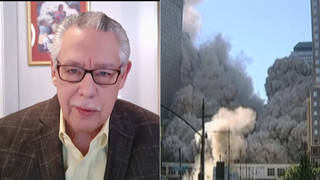

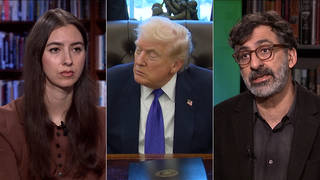
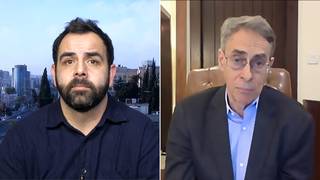





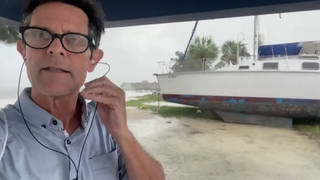

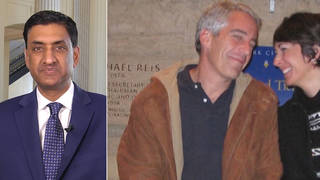
Media Options